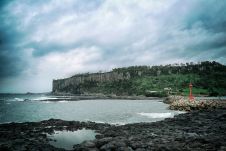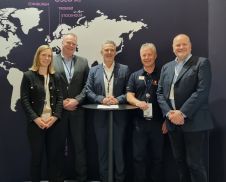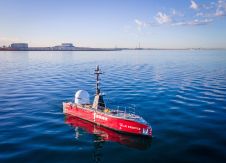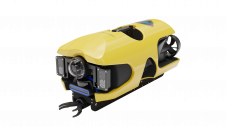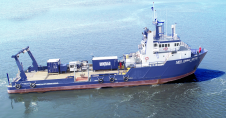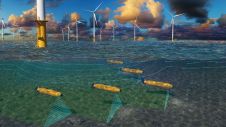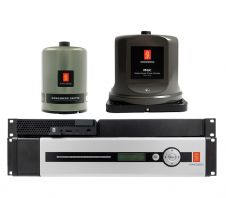A Triptych on Standards of Competence
The current status of hydrography is relatively new and one of the consequences is an ongoing search for appropriate standards of competence for personnel involved. It is not possible to lay down a single uniform set of standards as a strong relationship exists between standards and type/nature of activity. Hydro international interviewed three representatives of segments within hydrography, each with a differing approach to standards of competence. These views cover general hydrographic education, training and experience of offshore contract personnel and the outlook of a company providing such personnel.
Svante Astermo, FIG/IHO/ICA Advisory Board on Standards of Competence for Hydrographic Surveyors and Nautical Cartographers, Sweden
When was the Board extended with ICA?
ICA joined the Board in 2001 and it adopted the first edition of "Standards of Competence for Nautical Cartographers" in June 2003. The Board is presently developing the tenth edition of "Standards of Competence for Hydrographic Surveyors".
The Advisory Board is certifying educational institutes. Is it also looking after practical experience and, if so, in what way?
In the Standards, "Guidelines for Practical Experience" appear as Appendix II and every programme offered by institutions or organisations has to explain how the students get the required practical experience.
What is the view of the Board on certification of individual surveyors?
The Board does not provide recognition to individuals. However, it encourages institutions in each country to provide individual recognition to those who have completed a programme recognised as outlined in the Standards and have at least two years varied field experience in hydrographic surveying.
Your background is in land surveying and, having held the post of Swedish Hydrographer, you are now Chairman of the FIG/IHO/ICA Advisory Board on Standards of Competence for Hydrographic Surveyors and Nautical Cartogaraphers. Is there a difference between the "dry" (land) and "wet" (sea) certifications? Should certification be unified?
In land surveying there are master-programmes at universities in almost every country and these programmes have been given for many years and adjusted to the needs of the market and to the fast-changing techniques used. The Standards of Competence in Hydrographic Surveying are young and the Advisory Board has developed the Standards and then tried to update them every second year. As hydrography is very international and the shipping world needs to have common standards to be able to sail all over the world in the safe knowledge that charts are reliable, the need for "the Standards of competence" is more urgent. IHO has been working on Standards for long time, if we take into account the ECDIS and such things.
With the growing use of GPS and connecting continents the need for Standards in land surveying is growing. There is work going on in the commissions for Standards both internationally, at EU level and nationally but it seems to take a long time to find the minimum standards.
There has come into being close co-operation between land and sea surveying which may encourage the possibility of more unified certification. But I think this will take many years.
How are the certifications of the Board as related to IMCA certifications?
In coming editions the Board will compare the IMCA documentation with the Standards we are working with and take the best from both.
Are national certifications integrated in the international Board's certifications?
No.
Jane Bugler, IMCA, United Kingdom
IMCA is developing Standards of Competence for all sorts of offshore personnel. Can you briefly explain why IMCA started to do so and who initiated this activity?
IMCA's Competence Assurance & Assessment Scheme guidelines were developed to give IMCA members and clients confidence that the personnel they were using in safety-critical positions offshore could carry out their jobs in a safe and efficient manner. The Scheme guidelines provide a framework for IMCA members to follow for assessing and demonstrating to others (such as clients and regulatory bodies) the competence of these personnel.
This activity was initiated by the IMCA Training, Certification and Personnel Competence Committee, to which all IMCA members subscribe. The competence requirements detailed in the scheme documentation were established through a series of specialist working groups representing the four divisions of IMCA - Diving, Marine, Offshore Survey and Remote Systems & ROV.
Other organisations, for instance the FIG/IHO Advisory Board, are also working on standards of competence for hydrographic surveyors. What is your co-operation with such organisations? And if there is none, why is this?
As I have explained above, the IMCA Competence guidelines were developed using a similar format for all IMCA divisions and the Scheme focuses on workplace assessment. The IMCA Offshore Survey Division was aware of the work being undertaken by FIG/IHO and has reviewed their syllabus. The FIG/IHO work was very much based on training requirements to develop appropriate technical competence for use by training establishments in teaching hydrographic surveying. IMCA sees the work done by FIG/IHO as complementary to the IMCA Scheme, as IMCA recognises the importance of personnel receiving the appropriate basic technical training to undertake their work safely and efficiently.
Being a woman in a more or less male world of surveyors, do you give any special attention to making your Standards of Competence woman-friendly?
IMCA has developed its Competence guidelines to be internationally applicable. They do not differentiate between men and women, concentrating rather on the appropriate competence and knowledge needed to undertake the work safely.
It should be noted that the Offshore Survey Division members of IMCA employ a higher percentage of women than do other divisions and these numbers have increased significantly in recent years. One of our members reports fifteen (10 per cent) offshore survey field staff as being women.
What would be the ideal for Standards of Competence: universal unification or specific as per profession per area?
When IMCA developed its Competence guidelines, we were keen that these should be internationally applicable, intended for use by all IMCA members, regardless of geographical location of the work. The Competence guidelines now cover some 55 safety-critical positions in total, with separate competence tables for each of these positions. Particular to offshore surveying, the guidelines cover some sixteen different positions - the party chief, senior, grade I and grade II surveyors, survey engineers, geophysicists, data processors and pipeline inspection engineers.
However, it should be noted that the documents published by IMCA are guidelines and it remains for each contractor member to develop their own scheme based on the activities undertaken by their company. It would therefore be feasible for companies operating in different areas to develop specific schemes addressing local issues and/or work methods which relate back to the same common guidelines.
Cor Beemster, Skilltrade bv, The Netherlands
What is Skilltrade's meaning/definition of 'competence'?
In a competitive and rapidly changing working environment the classical personnel assessment, based on behavioural aspects and using criteria such as responsibility, initiative, team worker, etc, has proven to be no longer adequate.
Putting it straightforwardly, I could describe competence as the ability to demonstrate the actual requirements for a specific task in relation to knowledge, skill, experience and, last but not least, attitude.
The times in which a company engaged a post-graduate scholar for a lifetime of employment with moderate adjustments in the competencies required belong to the past.
Skilltrade is very much in favour of Competence Management. What do you see as the advantages?
Amongst several other reasons for a company to consider implementing a Competency Management System, I personally would consider the following,
- Effectively matching individual competencies to position, project team and job requirements.
- Prioritisation of competencies by job, project, or position and tracking an individual’s ability to fulfil requirements
- Integration of training and administration applications to focus training efforts
- Running gap and match analyses between individuals, jobs, teams and positions
- Increasing skill sets to meet an organisation's scope and growth
- Enhancing the general level of product quality
What do you see as the advantages of a software-based Competence Management System?
It depends from which angle you approach these software aids. From an educational perspective, a refined knowledge and skills gap analysis is essential to ensure maximum effectiveness of training.
From the trainee/employee's point of view, we have learned the added value of self-assessment. Most candidates show that they are aware of certain shortcomings and express a wish to be trained for various personal and employment-related reasons.
If a software-based Competency Management System demonstrates all of this, then it may prove a valuable aid.
And thirdly, there is the employer's side of the story. These people have a strong focus on operational management whereby items such as the right person on the right project and compatibility of competencies amongst employees are effective in a competitive industry. And all of this not to speak of the advantages for Human Resource departments, allowing them to use a navigational system for identifying training and promotions and compliance with the new ISO-9001: 2000 (Chapter 6) quality standard.
We know that some major marine and survey-related companies are implementing these software-based competency programs for reasons earlier mentioned.
Our conclusion is that the focus on human resources within a company is changing from the well-known job-profile matching towards the process of a profound and effective matching of competencies.
Skilltrade is applying Vocational Learning. Why? How do you integrate Vocational Learning with a Competence Management System?
Nowadays, the complexity and rapid pace of change in employment contexts, in addition to employers (or client) desire for adult skills and workforce training requires a flexible and devolved approach. A modular structure whereby an operational slot is followed up by short periods of theoretical training proves to be a very effective system in achieving the required competencies.
One should first set out objective and measurable criteria for each competency. In the field of Hydrography we have identified these criteria by using IHO/FIG/ICA and IMCA standards. All the gathered data was integrated in a Competence and Assessment software program, SkillsXP, allowing us to conduct intake and outcome assessments during the process of vocational training and to keep track of the progress of each candidate.

Value staying current with hydrography?
Stay on the map with our expertly curated newsletters.
We provide educational insights, industry updates, and inspiring stories from the world of hydrography to help you learn, grow, and navigate your field with confidence. Don't miss out - subscribe today and ensure you're always informed, educated, and inspired by the latest in hydrographic technology and research.
Choose your newsletter(s)












